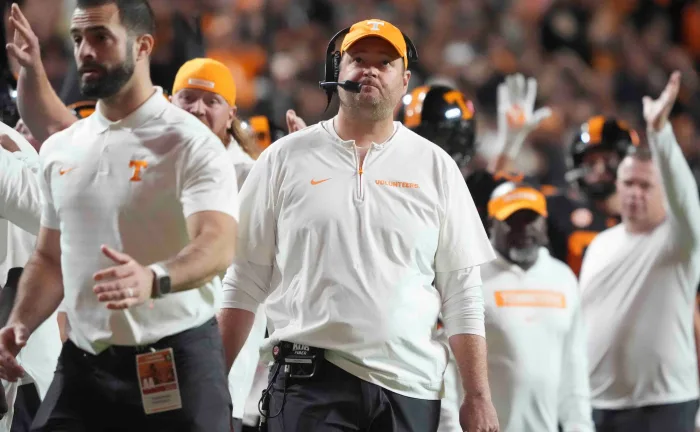Josh Heupel has transformed Tennessee’s football program with an electrifying, up-tempo offensive system that has captured national attention since his arrival in Knoxville. However, not everyone is completely sold on his approach. Recently, a former Tennessee Volunteers player shared his thoughts on what he believes is one of the major issues with Heupel’s offensive strategy. While the system has garnered praise for its explosive potential, the critique sheds light on some recurring concerns that may need to be addressed as the program continues its evolution.
The former player, who spoke anonymously to maintain a neutral position, pointed out that Heupel’s offense sometimes struggles with adaptability against top-tier defenses. “The system is great when everything clicks, but when you face elite defenses with speed and depth, it becomes predictable,” he said. He highlighted instances where Tennessee’s offense seemed to stall when opponents successfully adjusted to their tempo and spacing concepts.
The critique centers around the reliance on speed and timing, which can work against weaker or average teams but is often neutralized by disciplined, well-coached defenses in the SEC. “It’s a bit of a double-edged sword,” the player added. “When the fast pace works, it’s unstoppable. But when defenses anticipate the plays or disrupt the rhythm, there isn’t much Plan B to fall back on.”
Under Heupel, Tennessee’s offense has been one of the most productive in college football, ranking near the top nationally in total offense, scoring, and passing efficiency. The success was on full display in 2022, when the Vols defeated Alabama and finished the season with an 11-2 record, capped by a dominant win over Clemson in the Orange Bowl.
However, the cracks in the system became evident in losses. Against Georgia, for example, Tennessee’s offense was held to just 13 points despite entering the game as the nation’s highest-scoring unit. The Bulldogs effectively took away the vertical passing game and forced the Vols to rely on shorter plays and a running game that struggled to gain momentum.
The former player’s critique also touched on Heupel’s offensive identity being heavily reliant on the big play. “When you’re in an up-tempo system, there’s often less emphasis on grinding out drives with sustained runs or methodical short-yardage passes,” he explained. “If the deep shots don’t land, you’re suddenly in a lot of three-and-outs, and that wears out your defense.”
Indeed, a fast-paced offense can be a double-edged sword for a team’s defense. When drives fail quickly, it places significant strain on the defensive unit, forcing them back on the field with minimal rest. Against elite teams, this can lead to the defense being worn down in the second half, making it difficult to compete in tight games.
The former player suggested that the next step for Heupel’s offense could involve adding layers of complexity. Incorporating more diverse formations, misdirection plays, and a balanced running attack could make Tennessee’s offense less predictable. Additionally, slowing the pace at times to control the clock could help the defense avoid extended periods on the field.
Another solution would be enhancing the quarterback’s ability to audible at the line of scrimmage. Giving the signal-caller more freedom to adjust based on defensive alignments could prevent opponents from dictating the flow of the game.
Despite the critique, the former player acknowledged that Heupel has revitalized Tennessee football, bringing excitement back to a program that had been searching for consistency for over a decade. “What he’s done for Tennessee is incredible,” he said. “The players love playing in his system, and the fans love watching it. But for Tennessee to truly contend for a national championship, there’s got to be some evolution in the offense.”
The comments offer valuable insight as Heupel continues to refine his system in one of college football’s toughest conferences. The Vols have already demonstrated that they can compete with the best, but taking the next step will require addressing the flaws that surface against elite competition.
As Heupel and his staff prepare for the next season, the challenge will be balancing the dynamic, high-scoring identity of his offense with the adaptability needed to overcome top-tier opponents. If he succeeds, Tennessee’s potential to remain a perennial SEC contender will only grow.
